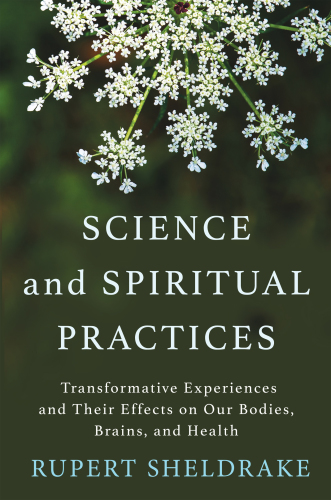
Science and Spiritual Practices
Transformative Experiences and Their Effects on Our Bodies, Brains, and Health
کتاب های مرتبط
- اطلاعات
- نقد و بررسی
- دیدگاه کاربران
نقد و بررسی

June 11, 2018
Biologist Sheldrake attempts to beat new atheists at their own game by using science to shore up devotion to spiritual practices in this persuasive appeal for a more enchanted world. To do that, he considers seven practices that are spiritually fulfilling while also having proven health benefits: meditation, gratitude, connecting with the non-human world, human-plant relationships, ritual, singing, and pilgrimage. For each, he provides a brief, intriguing history of its rise and modern diminishment across various traditions. Sheldrake pines for his vision of a less profane, more individualized past, as he makes clear through his laments about loss of connection to nature and the secularization of pilgrimages. He draws on a wide range of studies to show benefits for each type of worship: meditation increases the brain’s gray matter, gratitude leads to better health, and group singing enhances abilities to concentrate. A few fuzzy moments, including reliance on many studies about improved happiness and overly speculative accounts (such as his claims that ritual repetitions create an inheritable memory across generations), do not overwhelm the otherwise convincing work. With accessible suggestions, clear arguments, and an encouraging tone, Sheldrake makes a good case for reincorporating bygone spiritual habits.

June 15, 2018
A holistic exploration of spiritual and religious practices through a scientific lens.In this slim but dense and well-reasoned book, biologist Sheldrake (Science Set Free: 10 Paths to New Discovery, 2012, etc.) delves into seven common spiritual practices and relates the many healthy and transformative effects that can be attributed to each. The author offers a unique perspective as a well-regarded scientist with a profoundly grounded spiritual awareness. In the preface, he shares his particular path to enlightenment, from the secular and atheistic stance of his early scientific education to his eventual spiritual awakening through early experience with transcendental meditation and eventual travel to India, as well as his study of Hindu philosophy and Christian mysticism. Through all his studies, he has come to realize that "the old-fashioned opposition between science and religion is a false dichotomy. Open-minded scientific studies enhance our understanding of spiritual and religious practices." Sheldrake devotes separate chapters to meditation; the flow of gratitude, connecting with nature; relating to plants; rituals and their relation to the past; singing, chanting, and the power of music; and pilgrimage and holy places. Throughout, he displays his vast knowledge of religious history and a broad range of scientific research, and he closes each chapter with at least two examples for practical applications. By the concluding chapter, the author establishes further reasons for maintaining a balanced awareness of both scientific and spiritual studies, and he feels that scientism extremists are imposing an unjustly rigid worldview. "I was disillusioned when I found that some people have made science into a kind of religion and are often exceptionally dogmatic," he writes. "They accept the scientific worldview on faith, impressed by the authority and prestige of scientists, and imagine that they have arrived at this worldview by their own freethinking. I still believe in the ideal of open-minded science....In my own experience, believers in scientism are more dogmatic that most Christians."A simultaneously grounded and inspiring approach to appreciating the benefits of both science and religion.
COPYRIGHT(2018) Kirkus Reviews, ALL RIGHTS RESERVED.

























دیدگاه کاربران